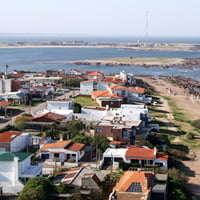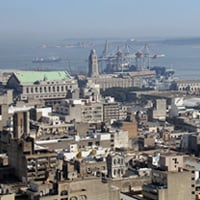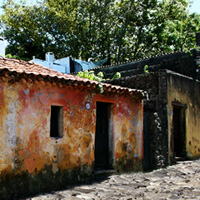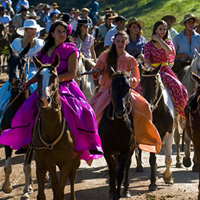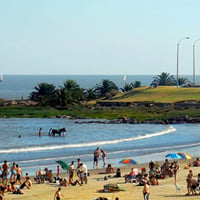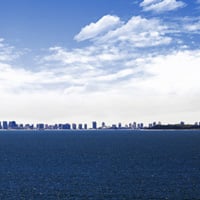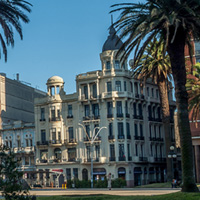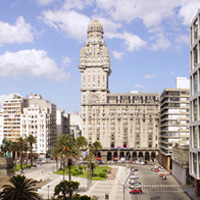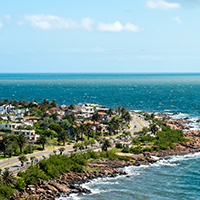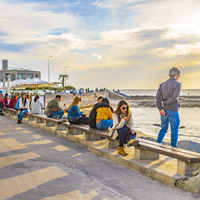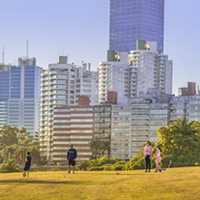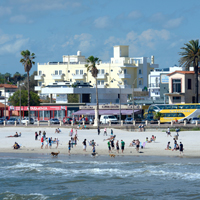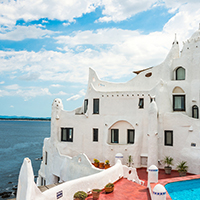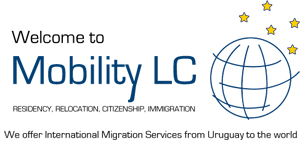Uruguay
Coastal BeachesUruguay, officially known as the Oriental Republic of Uruguay, is a country in the southeastern region of South America. It is the second-smallest nation in South America, bordered by Brazil to the north and east, Argentina to the west, and the Atlantic Ocean to the south. With a population of approximately 3.5 million people, of which around 1.8 million live in the metropolitan area of its capital and largest city, Montevideo, Uruguay is known for its stable democracy, progressive social policies, and robust civic freedoms. The country has a rich cultural heritage, with influences from European and African traditions, reflected in its music, dance, and literature. The landscape of Uruguay is characterized by rolling plains, fertile agricultural land, and a temperate climate, making it ideal for livestock and crop farming. The economy is largely driven by agriculture, particularly soybeans, beef, and dairy products, as well as a growing technology sector. Uruguay is renowned for its high literacy rates, advanced education system, and a strong social safety net, including universal health care. The country has a reputation for being one of the most socially progressive countries in Latin America, having legalized same-sex marriage and cannabis. Tourism in Uruguay is a significant industry, with visitors drawn to its historic cities, beach resorts, and rural estancias. The nation's commitment to environmental sustainability is evident in its efforts to protect its natural resources and use renewable energy. Uruguay's football culture is also a point of national pride, with a rich history in the sport, including winning the FIFA World Cup twice. Overall, Uruguay offers a high quality of life, a peaceful atmosphere, and a welcoming environment for both its citizens and visitors.
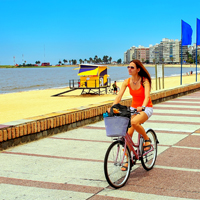 Mobility LC
Mobility LCConnect
Mobility LC is committed to work hard to make your Uruguayan immigration and relocation process a reality. We can provide you with the best local contacts and will guide you all the way through the process offering support in 5 different languages. Your success is our personal goal.
Click connect to have our partner contact you via e-mail and/or phone.
 Mobility LC
Mobility LCMobility LC is committed to work hard to make your Uruguayan immigration and relocation process a reality. We can provide you with the best local contacts and will guide you all the way through the process offering support in 5 different languages. Your success is our personal goal.
Connect
Click connect to have our partner contact you via e-mail and/or phone.
Living in Uruguay
Best Places to Live in Uruguay
Visa & Residency
Uruguay is known for its welcoming policy towards expats and retirees, offering a straightforward process for obtaining residency. The most popular visas for expats are the Rentista Visa, for individuals with a steady income from outside Uruguay, and the Pensionado Visa, for retirees with a pension. Digital nomads often opt for Uruguay’s Temporary Residence Visa, which allows them to live in the country for up to two years, with the possibility of extension or applying for permanent residency. To begin the residency process in Uruguay, expats must first enter the country on a tourist visa. Once in Uruguay, the individual must apply for residency through the Dirección Nacional de Migración (National Migration Directorate). The application requires various documents, including a birth certificate, proof of income, and a certificate of good conduct from the applicant's country of origin. All documents from abroad must be apostilled or legalized and translated into Spanish. The Rentista Visa requires proof of a monthly income of at least USD 1,500 from a stable source, such as investments, properties, or businesses outside of Uruguay. The Pensionado Visa, on the other hand, requires proof of receiving a pension, with a minimum amount that is periodically adjusted for inflation. Once the application is submitted, the expat must undergo a health check in Uruguay. After the health check and submission of all required documents, the expat will receive a temporary resident ID, known as a cédula, which allows them to live and work legally in Uruguay while their residency application is being processed. The process is generally considered easy compared to other countries, especially for those from the Mercosur countries, who benefit from a simplified process. However, it can take several months to a year for the residency to be approved. Once approved, the expat can apply for permanent residency, which can be granted after two years of temporary residency. Permanent residents are eligible to apply for Uruguayan citizenship after five years of residence in the country.
Healthcare in Uruguay
Uruguay's healthcare system is considered one of the most accessible and equitable in Latin America. The system is a mix of public and private sectors. The public sector is funded by taxes and is available to all citizens and legal residents, including expats who have residency status. The private sector operates through mutualistas, which are membership-based health organizations that provide a higher level of care and more facilities, often with shorter waiting times. Expats and digital nomads can access public healthcare once they have legal residency, which involves registering with the Ministry of Public Health and contributing to the social security system. Private healthcare is also an option for expats, which can be accessed by paying for services directly or through private insurance. The quality of healthcare in Uruguay is generally good, with a high ratio of medical professionals to population and modern medical facilities, especially in Montevideo. However, there can be variations in quality and waiting times between public and private providers, and more remote areas may have less access to advanced care. The cost of public healthcare is covered by taxes and social security contributions, while private healthcare costs can vary widely depending on the services and level of coverage chosen.
Cost of Living
The cost of living in Uruguay is considered moderate when compared to other countries in the region. While some services and goods can be on the higher side, especially in tourist areas and the capital, overall expenses such as housing, utilities, and groceries are reasonable.
Weather
Uruguay has a temperate climate with warm summers and cool winters. The weather is fairly uniform nationwide, although rainfall varies with region. Summers are typically warm with occasional heat waves, while winters can be chilly and damp. Spring and autumn are mild and are generally the most pleasant times to visit.
Educational System in Uruguay
The educational system in Uruguay is known for being one of the most advanced in Latin America, with a strong emphasis on free and secular education. Education in Uruguay is compulsory for children between the ages of 4 and 14, starting with pre-primary education (Educación Inicial) for children aged 4 to 5. Primary education (Educación Primaria) follows, lasting for six years, from ages 6 to 11. Secondary education (Educación Media) is divided into two cycles: lower secondary (Ciclo Básico) for three years, and upper secondary (Bachillerato), which also lasts for three years and is divided into different orientations such as humanities, biology, or art. Students typically start school in March and end in December, with a winter break in July. Upon completion of secondary education, students receive a diploma (Bachillerato), which is required for university admission. The Uruguayan education system is well-regarded for its high literacy rates and the government's commitment to education, with significant investment in educational technology, including the Plan Ceibal initiative, which provides laptops and tablets to students.
Copyright 1997-2025 Burlingame Interactive, Inc.

